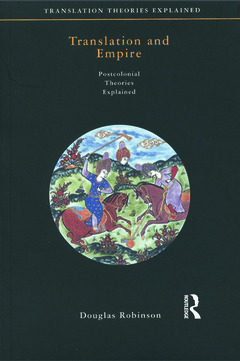Translation and Empire Postcolonial Theories Explained Translation Theories Explored Series
Auteur : Robinson Douglas

1. Postcolonial Studies, Translation Studies
Translation and empire
What does postcolonial mean?
The rise of postcolonial theory
Hegemony, subjectification and interpellation
Language, place and self
Beyond nationalism: migrant and border cultures
2. Power Differentials
Translating across power differentials
Disproportionate translations
'Inscrutable' texts
Stereotypes
Writing for translation
Theorizing across power differentials
3. Translation as Empire: The Theoretical Record
Emperors and displaced populations
The sublimation of empire: Cicero and Horace
Translatio Imperii et Studii
Taking the original captive
Translation and empire
4. Translation and the Impact of Colonialism
Eric Cheyfitz and the colonization of the New World
Repression and hierarch
Projection
Eloquence and dialogue
Property
Centre and periphery
Niranjana and the British interpellation of India
Rafael and the Spanish conversion of the Tagalogs
The hierarch of languages
Confession
5. Resistance, Redirection, and Retranslation
Tejaswini Niranjana and retranslation
Vicente Rafael and mistranslation
Samia Mehrez and métissés
6. Criticisms
Date de parution : 11-1997
15.6x23.4 cm
Date de parution : 05-2016
15.6x23.4 cm
Thème de Translation and Empire :
Mots-clés :
postcolonial; theory; theories; assimilative; imperii; niranjanas; siting; decolonized; future; hegemonic; Niranjana’s Siting Translation; Translatio Imperii; Postcolonial Translation Theory; Quintus Horatius Flaccus; Samia Mehrez; Postcolonial Translation; Modern Languages; Postcolonial Translation Studies; Tejaswini Niranjana; Assimilative Translations; Eric Cheyfitz; Translation Studies; Hoi Polloi; Translation Studies Journals; Target Language Reader; Translation Theory; Foreignizing Translations; Discrepant Identities; Studying Translation Processes; Aulus Gellius; Fourteenth Century France; Unowned Land; Roman Antiquity; Postcolonial Theorists; Gramática De La Lengua Castellana



